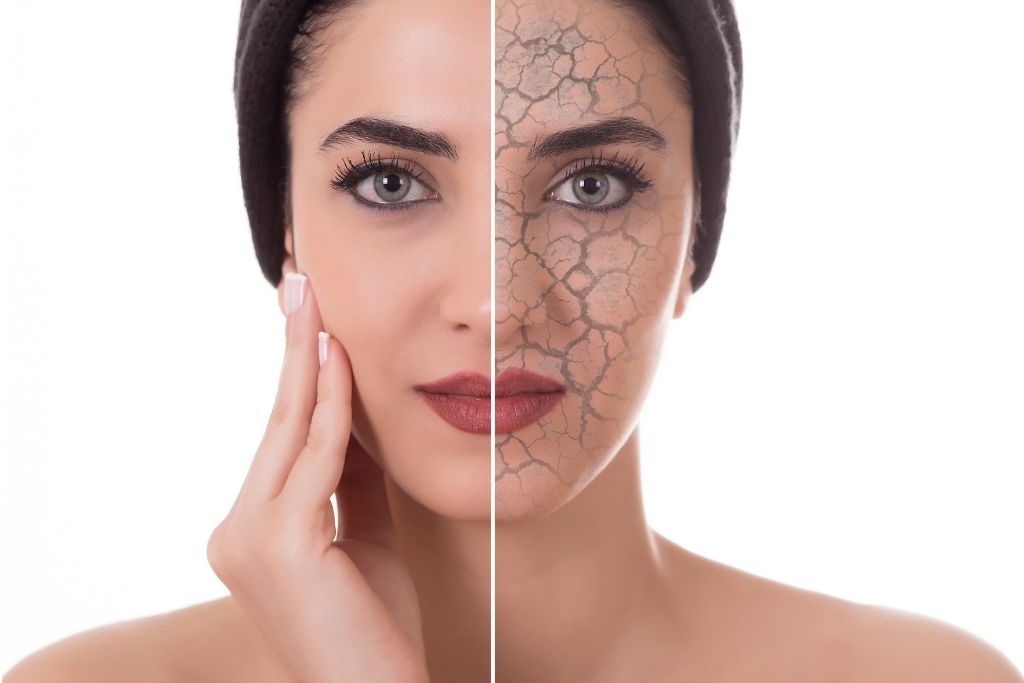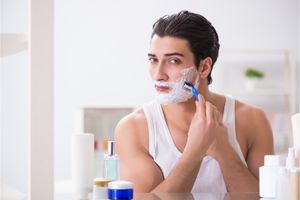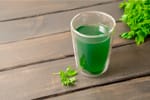Everyone wants to have clear, glowing, and radiant skin. However, people with dry skin often face the challenge of finding the right skincare routine to keep their skin moisturized and healthy.
Dry skin is prone to flakiness, irritation, and premature aging. If you are someone with dry skin, it is crucial to follow a proper skincare routine to ensure that your skin is well-nourished and protected from external factors that can harm it.
Here are ten skin care tips that can help you keep your skin healthy and glowing.
1)) Hydrate From Within
Drinking plenty of water is vital to keep your skin hydrated and healthy.
When you don't drink enough water, your skin becomes dull and dehydrated, making it look lifeless and tired.
Make sure to drink about eight glasses of water every day to keep your skin moisturized from within.
Tips To Help You Get Hydrated:
- Incorporate Hydrating Foods in Your Diet: Foods rich in water content such as cucumbers, oranges, and watermelon can help supplement your water intake and keep your skin hydrated.
- Avoid Caffeinated Drinks: Beverages like coffee and tea can dehydrate your body. Try to limit your consumption and always compensate with an equal amount of water.
- Drink More After Exercising: Physical activity can lead to loss of fluids through sweating. It's important to replace these fluids by drinking more water post-workout to maintain proper skin hydration.
Internal hydration plays a fundamental role in maintaining skin health, especially for those with dry skin.
It's not just about drinking water; incorporating hydrating foods into your diet and being mindful of your beverage choices also contribute significantly.
Compensate for fluid loss after exercise to ensure your skin remains radiant and well-moisturized.
The key to glowing skin might just be a glass of water away!
2)) Use A Gentle Cleanser
Avoid using harsh soaps and facial washes that can strip your skin of its natural oils.
Use a gentle, non-comedogenic cleanser that does not clog your pores and is specifically formulated for dry skin.
Cleansing with your fingertips or a soft cloth helps to avoid irritation and dryness.
Pro-Tip: When choosing a gentle cleanser for dry skin, look for products with hydrating ingredients like hyaluronic acid, glycerin, or ceramides that can provide much-needed moisture. Avoid products with alcohol, fragrances, or sulfates, as these can further dry out your skin. Always read the labels and opt for cleansers marketed as 'gentle', 'hydrating', or 'for dry skin'. If unsure, consulting a dermatologist for a personalized recommendation can be beneficial. Everyone's skin is unique, and what works for one may not work for another.
Choosing the right cleanser is foundational to any skincare routine, especially for those dealing with dry skin.
Gentle, hydrating cleansers help maintain the skin's natural oils, preventing dryness and irritation.
Skincare is highly personal, and the best product is the one that works well for your skin type.
It's worth investing time to find a gentle, non-comedogenic cleanser that meets your specific needs, and when in doubt, don't hesitate to consult a dermatologist.
3)) Moisturize Regularly
Moisturizing is a crucial step in a dry skin care routine. Never skip it! Use a good quality, moisturizer that suits your skin type, and apply it immediately after cleansing.
With additional ingredients like ceramides and hyaluronic acid, you can help lock in moisture for longer periods of time.
Application Tips:
- Apply While Skin is Still Damp: For the best results, apply your moisturizer while your skin is still slightly damp from cleansing. This helps to lock in the moisture and keeps your skin hydrated for longer.
- Use the Right Amount: Too much moisturizer can lead to clogged pores, while too little won't provide enough hydration. A dollop the size of a nickel is usually sufficient for your face.
- Don't Forget Your Neck and Chest: These areas are often neglected but are just as prone to dryness. Extend your moisturizing routine to your neck and chest to maintain overall skin health.
Regular moisturization is an essential element in a skincare routine, especially for those with dry skin.
The correct application technique can significantly increase the effectiveness of your moisturizer.
Applying it while your skin is still damp, using the right amount, and not neglecting your neck and chest are all crucial practices. Consistency is key.
Make moisturizing a daily habit for a healthier and more hydrated complexion.
4)) Exfoliate Gently
Exfoliating removes dead skin cells, revealing fresher, smoother skin. But it's crucial to be gentle with your dry skin.
Use a mild exfoliant no more than twice a week, and avoid harsh scrubs that can irritate or damage your skin.
Tips For Choosing A Mild Exfoliant:
- Opt for Chemical Exfoliants: Chemical exfoliants such as alpha and beta hydroxy acids (AHAs and BHAs) can be gentler on dry skin compared to physical scrubs. They help to dissolve dead skin cells without the need for scrubbing.
- Look for Hydrating Ingredients: Choose exfoliants with hydrating properties like hyaluronic acid or glycerin which can help maintain skin hydration during the exfoliation process.
- Avoid Harsh Grains: If you prefer physical exfoliants, pick products with smooth, fine particles instead of coarse, rough grains which can cause micro-tears and further dry out the skin.
- Patch Test: Always perform a patch test when trying a new exfoliant to ensure it doesn't irritate your skin.
- Consult a Dermatologist: If you're unsure about what product to use, don't hesitate to consult a dermatologist to guide you toward the most suitable exfoliant for your skin type.
Exfoliating gently plays a key role in a dry skin care routine, helping to slough off dead skin cells and reveal a healthier, more radiant complexion.
Whether you opt for chemical exfoliants or prefer physical ones, it's important to choose products that are mild, hydrating, and suitable for dry skin.
Avoid harsh, abrasive particles that can irritate your skin, and always conduct a patch test before integrating a new product into your routine.
Everyone's skin is unique; when in doubt, a dermatologist can provide personalized advice for choosing the right exfoliant.
5)) Avoid Hot Water And Steam
Hot water and steam can be harmful to dry skin because they can strip your skin of its natural oils and moisture.
Take quick showers instead of long hot baths or showers. Also, be careful not to rub your skin roughly when drying yourself with a towel.
Avoiding hot water and steam is a critical step in maintaining moisture levels for dry skin.
The heat can strip your skin of its natural oils, leading to dryness and irritation.
Opting for shorter, cooler showers and being gentle when drying can make a significant difference in your skin's health.
A skincare routine is not just about what products you apply, but also about making mindful choices throughout your day.
6)) Wear Sunscreen
People with dry skin may think that they don't need sunscreen, but that’s not true.
Protecting your skin from the sun’s harmful rays is essential in maintaining healthy skin and preventing early signs of aging.
Use a broad-spectrum sunscreen with an SPF of at least 30 to provide protection against both UVA and UVB rays.
Daily sunscreen use is not just for those with oily or combination skin - it's a non-negotiable part of skincare for everyone, including those with dry skin.
Sunscreen shields your skin from harmful UVA and UVB rays, which can lead to premature aging and skin damage.
A broad-spectrum sunscreen with an SPF of at least 30 helps maintain your skin's health and moisture level, ultimately contributing to its overall glow and vitality.
Skincare is a holistic routine that goes beyond just moisturizing and cleansing - it's about protecting your skin every day, in every way.
7)) Don't Overuse Makeup
If you have dry skin, avoid using too much makeup, as it can dry out your skin even more.
Also, avoid using any makeup products that have alcohol or fragrances as they can harm and irritate your skin.
Always use a primer before applying makeup, to ensure that the skin maintains a moisturizing barrier, preventing flakiness and dry skin.
Taking a mindful approach to makeup application is especially crucial for those dealing with dry skin.
Overuse of makeup, or using products containing alcohol or fragrances, can further exacerbate dryness and cause irritation.
An effective strategy is to ensure your skin maintains a moisturizing barrier, by using a primer before any makeup application.
This not only prevents flakiness but also contributes to healthier skin in the long run. In essence, less is more when it comes to makeup for dry skin.
Prioritize skin health over temporary aesthetics for a long-lasting, natural glow.
8)) Use Humidifiers
Adding moisture to the air soothes dry skin and can provide numerous health benefits.
Humidifiers add moisture to the air and can help improve the texture and overall health of your skin.
Use a humidifier in your office or home to keep the air moist.
Pro-Tip: When choosing a humidifier for dry skin, look for one with a built-in hygrometer, which measures the humidity levels in the room. This feature can help you maintain the ideal humidity level of 40% - 60% for your skin. Consider the size of the room where you'll use the humidifier. A device too small may not effectively moisten the air, while one too large could promote mold growth. Lastly, opt for a device that has easy-to-clean features to avoid the build-up of bacteria and molds, which can trigger skin and respiratory issues.
Incorporating a humidifier into your environment is a practical way to address dry skin, especially in drier climates or heated indoor spaces.
These devices improve the moisture levels in the air, contributing to better skin texture and overall health.
It's recommended to use a humidifier in spaces where you spend a significant amount of time, like your office or home.
Caring for your skin goes beyond topical treatments; sometimes, the best solution is as simple as enhancing the air you breathe.
9)) Avoid Harsh Winds
Cold, harsh winds can harm your skin, leaving it dry and sensitive. Wear clothes that cover your skin, to protect it from the harsh winter elements.
Apply a thick moisturizer, especially before stepping outdoors.
Guarding your skin against harsh winds is an essential component of skincare, especially for individuals with dry skin.
These conditions can exacerbate dryness and sensitivity, stripping your skin of necessary moisture.
Dressing appropriately to cover your skin and applying a thick moisturizer before stepping outdoors can act as a shield against the damaging effects of the elements.
Effective skincare isn't only about product selection; it also involves adapting your routine according to changing weather conditions.
10)) Visit A Dermatologist
If you are worried about your dry skin, it’s best to visit a board-certified dermatologist.
A dermatologist can give you a tailored skincare routine that meets your individual needs.
They can help you determine the right moisturizers, creams, or topical treatments to ensure healthy and smooth skin.
Tips For Choosing A Dermatologist:
- Check Their Credentials: Ensure the dermatologist is board-certified and has undergone specialized training in dermatology. You can generally find this information on their website or online profiles.
- Experience with Dry Skin Conditions: Choose a dermatologist with experience in treating dry skin conditions. They'll have a better understanding of your skin and can provide personalized treatment options.
- Ask for Recommendations: Ask friends, family, or other healthcare providers for recommendations. Personal experiences can give you valuable insights into a dermatologist's practice.
- Consider the Location: Choose a dermatologist in a location that's convenient for you. This will make regular appointments and follow-ups easier.
- Review Patient Feedback: Look at reviews and patient feedback online to get an understanding of the doctor's practice and patient satisfaction.
- Assess the Clinic Environment: The clinic should be clean, organized, and have up-to-date equipment. Your comfort should be a priority.
- Insurance Coverage: If you have health insurance, pick a dermatologist within your provider's network to minimize costs.
Making a decision to visit a dermatologist for your dry skin concerns is a responsible step towards self-care.
A board-certified dermatologist, equipped with the knowledge and experience in dealing with dry skin conditions, can provide you with a customized skincare routine tailored to your unique needs.
From pinpointing the right moisturizers and creams to recommending effective topical treatments, they can guide you on the path to achieving healthy and smooth skin.
It's not just about managing symptoms, but about finding long-term solutions for your skin health.
Conclusion
Managing dry skin involves a holistic approach that combines the right skincare products, lifestyle changes, and professional advice.
Understanding your skin type and tailoring your skincare routine accordingly can significantly improve the health and texture of your skin.
From selecting the correct moisturizers and makeup to using humidifiers and protecting your skin from harsh environmental elements, every step plays a crucial role.
And of course, when in doubt, consulting a dermatologist is always a wise choice.
Skincare is not just a routine, it's a form of self-care. Nurture your skin, and it will surely thank you!
Related Articles and Guides
- How To Get Rid Of Dry Skin On Face
- How To Get Rid Of Dead Skin On Feet
- How To Get Rid Of Dry Flaky Skin Around Nose
- How To Get Rid Of Dry Skin On Lips
- 10 FAQs About How To Get Rid Of Dry Skin
Download Our Free E-book!







